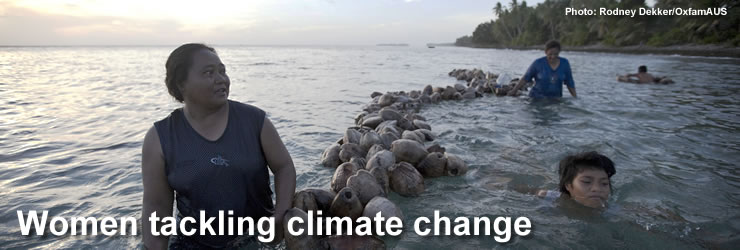 Women tackle climate change.
Women tackle climate change. Source: http://adoptanegotiator.org/wp-content/uploads/2011/10/ClimateChange-WomenPacific-36226-740.jpg
Bernadette Resurreccion of the Asian institute of Technology recently examined whether we are experiencing a return to the old narratives regarding women and the environment. In her paper, “Persistent women and environment linkages in climate changeand sustainable development agendas“, she found evidence that advocates, researchers and development practitioners are resorting to simplistic and potentially distorting narratives that women are more in tune with the natural world and are greater victims than men of environmental damage. Dr Resurreccion comprehends the temptations of using these challenged narratives as entry points to advocacy but warns against this expediency because much more nuanced actions and interventions will be needed than the often-simplistic ones suggested by the narratives.
The paper can be downloaded here.
S y n o p s i s
Since the 1980s, the discourse that women are intrinsically closer to nature, are hardest hit by environmental degradation, and have special knowledge of natural resource systems has influenced development policy circles and intervention programmes globally. Despite criticism being levelled time and again at the discourse’s potential risk of passing on the burden of environmental care onto women while letting men off the hook, the argument still holds strong sway in current climate change debates. Women are once again being singled out
as climate victims and ‘powerful agents of change, as they are seen to lead early warning systems and identify water supplies that have saved climate change affected communities’. The paper explores why and how women–environment linkages remain seductive and influential, and forwards three arguments for this: first, for gender to muster entry into climate politics, women’s identities are projected as fixed, centred, and uniform — and tied to nature; second, the discourse of climate change vulnerability has proven to be a strategic entry point for feminist advocacy; and finally, inertia associated with past environmental projects has reinstated the women–environment discourse in contemporary climate change discussions and possibly, future interventions.
This entry was posted in: Women
